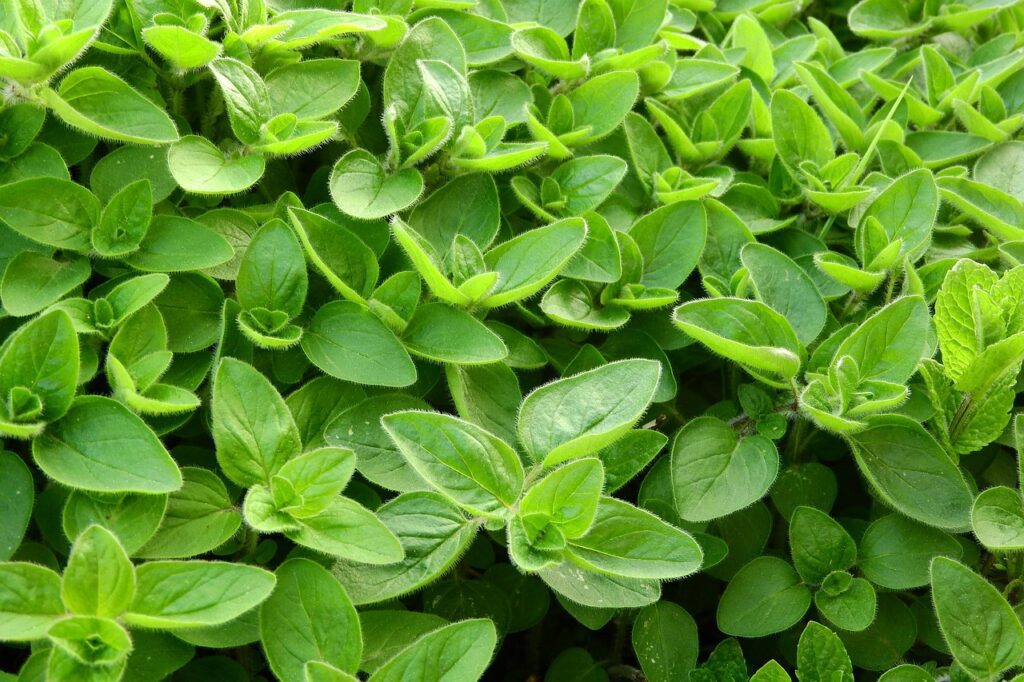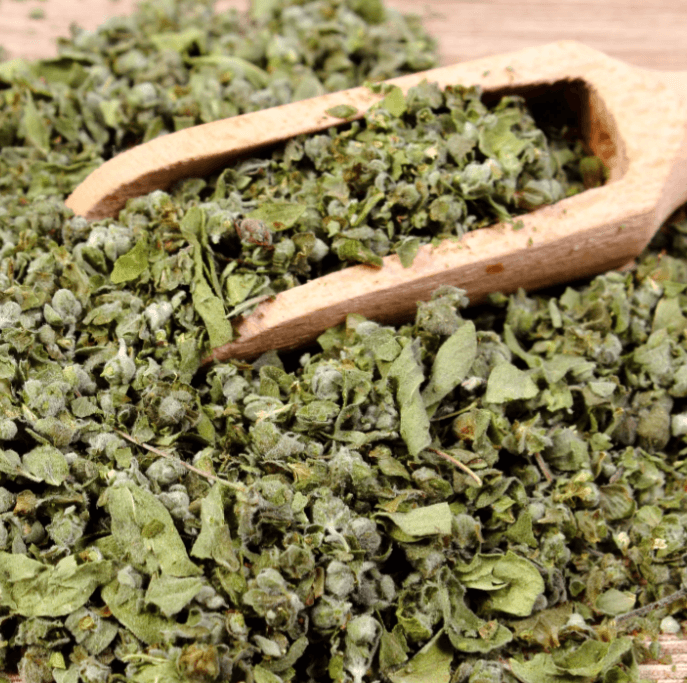
When it comes to herbs and spices, marjoram often flies under the radar. While it’s a staple in Mediterranean and Middle Eastern cuisines, many people don’t realize just how powerful this humble herb can be for your health. Marjoram isn’t just a flavor enhancer—it’s a healing spice with a long history of medicinal use. From preventing chronic diseases like Alzheimer’s and cancer to soothing digestive issues and fighting fungal infections, marjoram is a true powerhouse.
In this blog, we’ll explore the incredible health benefits of marjoram, referencing insights from The Healing Spices by Bharat B. Aggarwal. This book dives deep into the science behind the healing properties of spices, and marjoram is no exception. So, whether you’re a foodie, a health enthusiast, or just curious about natural remedies, let’s uncover why marjoram deserves a spot in your kitchen—and your medicine cabinet.
What Is Marjoram?
Marjoram (Origanum majorana) is a fragrant herb that belongs to the mint family, closely related to oregano. It has a sweet, slightly citrusy flavor and is often used in soups, stews, salads, and meat dishes. But marjoram is more than just a culinary delight—it’s been used for centuries in traditional medicine to treat a variety of ailments.
The ancient Greeks and Romans revered marjoram for its healing properties, using it to soothe digestive issues, relieve pain, and even as a symbol of happiness. Today, modern science is catching up to what ancient healers knew all along: marjoram is packed with compounds that can benefit your health in profound ways.

Marjoram and Alzheimer’s Disease: Protecting Your Brain
Alzheimer’s disease is a devastating condition that affects millions of people worldwide. While there’s no cure, research suggests that certain spices, including marjoram, may help protect the brain and reduce the risk of cognitive decline.
How Marjoram Helps Prevent Alzheimer’s
- Rich in Antioxidants
Marjoram is loaded with antioxidants, including rosmarinic acid and carvacrol, which help combat oxidative stress in the brain. Oxidative stress is a major contributor to Alzheimer’s disease, as it damages brain cells and impairs cognitive function. - Anti-Inflammatory Properties
Chronic inflammation is another key factor in the development of Alzheimer’s. Marjoram’s anti-inflammatory compounds help reduce inflammation in the brain, protecting neurons and supporting overall brain health. - Enhances Memory and Cognitive Function
Some studies suggest that marjoram may improve memory and cognitive function by promoting healthy blood flow to the brain and supporting the growth of new neurons.
Scientific Evidence
A study published in the Journal of Neurochemistry found that rosmarinic acid, a key compound in marjoram, has neuroprotective effects and can help reduce the risk of neurodegenerative diseases like Alzheimer’s.
How to Use Marjoram for Brain Health
- Add fresh or dried marjoram to soups, stews, and salads.
- Brew marjoram tea by steeping fresh or dried leaves in hot water.
- Use marjoram essential oil in a diffuser to enjoy its calming, brain-boosting aroma.
Marjoram and Cancer: A Natural Defense
Cancer is one of the leading causes of death worldwide, but research shows that certain spices, including marjoram, may help reduce the risk of developing this disease.
How Marjoram Helps Fight Cancer
- Antioxidant and Anti-Tumor Properties
Marjoram contains compounds like quercetin and apigenin, which have been shown to inhibit the growth of cancer cells and prevent tumor formation. - Induces Apoptosis
Apoptosis is the process of programmed cell death, which is essential for preventing the growth of cancerous cells. Marjoram’s bioactive compounds can trigger apoptosis in cancer cells, effectively stopping them in their tracks. - Protects DNA
The antioxidants in marjoram help protect DNA from damage caused by free radicals, reducing the risk of mutations that can lead to cancer.
Scientific Evidence
A study published in Oncology Reports found that carvacrol, a compound in marjoram, has potent anti-cancer properties and can inhibit the growth of breast cancer cells.
How to Incorporate Marjoram for Cancer Prevention
- Use marjoram as a seasoning for grilled vegetables, meats, and fish.
- Add it to homemade salad dressings or marinades.
- Enjoy marjoram tea regularly as part of a cancer-preventive diet.
Marjoram and Fungal Infections: A Natural Antifungal
Fungal infections, such as candida, can be stubborn and difficult to treat. Fortunately, marjoram has potent antifungal properties that can help combat these infections.
How Marjoram Fights Fungal Infections
- Antifungal Compounds
Marjoram contains compounds like thymol and carvacrol, which have been shown to inhibit the growth of fungi, including Candida albicans. - Boosts Immune Function
A strong immune system is essential for fighting off fungal infections. Marjoram’s immune-boosting properties help your body defend itself against harmful pathogens.
Scientific Evidence
A study published in the Journal of Medicinal Food found that marjoram essential oil has significant antifungal activity against Candida species.
How to Use Marjoram for Fungal Infections
- Apply diluted marjoram essential oil topically to affected areas (always do a patch test first).
- Drink marjoram tea to support your immune system.
- Add marjoram to your meals to enjoy its antifungal benefits.
Marjoram and Heart Disease: Supporting Cardiovascular Health
Heart disease is a leading cause of death globally, but marjoram can play a role in keeping your heart healthy.
How Marjoram Benefits Heart Health
- Lowers Blood Pressure
Marjoram has been shown to help relax blood vessels, improving blood flow and reducing blood pressure. - Reduces Cholesterol Levels
The antioxidants in marjoram help lower LDL (bad) cholesterol and increase HDL (good) cholesterol, reducing the risk of heart disease. - Anti-Inflammatory Effects
Chronic inflammation is a major contributor to heart disease. Marjoram’s anti-inflammatory properties help protect the heart and blood vessels.
Scientific Evidence
A study published in the Journal of Cardiovascular Pharmacology found that marjoram extract can significantly reduce blood pressure in hypertensive rats.
How to Use Marjoram for Heart Health
- Sprinkle marjoram on roasted vegetables or grilled meats.
- Brew marjoram tea and enjoy it daily.
- Use marjoram essential oil in a diffuser to promote relaxation and reduce stress, which is also beneficial for heart health.
Marjoram and Digestive Health: Soothing Indigestion and Ulcers
If you’ve ever struggled with indigestion, bloating, or stomach ulcers, marjoram might be just what you need.
How Marjoram Supports Digestive Health
- Relieves Indigestion
Marjoram has carminative properties, meaning it helps reduce gas and bloating while promoting healthy digestion. - Heals Ulcers
The anti-inflammatory and antimicrobial properties of marjoram can help soothe stomach ulcers and protect the stomach lining. - Stimulates Digestive Enzymes
Marjoram stimulates the production of digestive enzymes, helping your body break down food more efficiently.
Scientific Evidence
A study published in Phytotherapy Research found that marjoram extract can protect against gastric ulcers by reducing stomach acid and increasing mucus production.
How to Use Marjoram for Digestive Health
- Add marjoram to soups, stews, and casseroles.
- Drink marjoram tea after meals to aid digestion.
- Use marjoram essential oil in a massage blend to relieve stomach discomfort.
The Science Behind Marjoram: Insights from The Healing Spices
In The Healing Spices by Bharat B. Aggarwal, marjoram is highlighted for its impressive array of health benefits. Aggarwal explains how the bioactive compounds in marjoram, such as rosmarinic acid, carvacrol, and thymol, contribute to its antioxidant, anti-inflammatory, and antimicrobial properties.
One of the key takeaways from the book is that marjoram works best as part of a holistic approach to health. This means combining it with a balanced diet, regular exercise, and stress management techniques for optimal results.
Tips for Buying and Storing Marjoram
To get the most out of marjoram’s health benefits, it’s important to choose high-quality herbs and store them properly. Here are some tips:
- Buy Fresh or Dried: Fresh marjoram has a more vibrant flavor, but dried marjoram is more convenient and has a longer shelf life.
- Check the Aroma: High-quality marjoram should have a strong, sweet, and slightly citrusy aroma.
- Store Properly: Keep dried marjoram in an airtight container in a cool, dark place. Fresh marjoram can be stored in the refrigerator, wrapped in a damp paper towel.
Final Thoughts
Marjoram is more than just a flavorful herb—it’s a healing spice with a wide range of health benefits. From protecting your brain and heart to fighting cancer and fungal infections, marjoram is a natural remedy worth incorporating into your daily life.
As we’ve seen, the compounds in marjoram, such as rosmarinic acid and carvacrol, play a key role in its health-promoting properties. And with insights from The Healing Spices by Bharat B. Aggarwal, we can better understand the science behind this incredible herb.
So, the next time you’re cooking, don’t forget to reach for the marjoram. Whether you’re sprinkling it on your food or brewing it into a tea, you’ll be doing your body a favor. And who knows? You might just discover a new favorite herb along the way!
Have you tried using marjoram for its health benefits? Share your experiences in the comments below!
